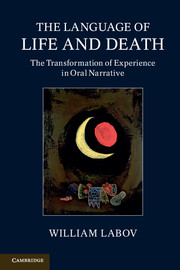Book contents
- Frontmatter
- Contents
- Preface
- Acknowledgments
- 1 Introduction to the language of life and death
- 2 Narrative analysis
- 3 The escalation of violence
- 4 Confrontations with death
- 5 Premonitions and communication with the dead
- 6 Margie Knott: “Her confrontation with the neighbors”
- 7 Gloria Stein: “They stoned the house”
- 8 Rose Norman: “The death of her younger sister”
- 9 Mary Costa: “The death of her youngest daughter”
- 10 Cache County
- 11 The vernacular origin of epic style
- 12 Historians' use of narrative
- 13 Thomas Babington Macaulay: “The death of Monmouth”
- 14 S. T. Bindoff: “The death of Elizabeth”
- 15 2 Samuel: “The death of Absalom”
- 16 The narrative view of death and life
- References
- Index
3 - The escalation of violence
Published online by Cambridge University Press: 05 June 2013
- Frontmatter
- Contents
- Preface
- Acknowledgments
- 1 Introduction to the language of life and death
- 2 Narrative analysis
- 3 The escalation of violence
- 4 Confrontations with death
- 5 Premonitions and communication with the dead
- 6 Margie Knott: “Her confrontation with the neighbors”
- 7 Gloria Stein: “They stoned the house”
- 8 Rose Norman: “The death of her younger sister”
- 9 Mary Costa: “The death of her youngest daughter”
- 10 Cache County
- 11 The vernacular origin of epic style
- 12 Historians' use of narrative
- 13 Thomas Babington Macaulay: “The death of Monmouth”
- 14 S. T. Bindoff: “The death of Elizabeth”
- 15 2 Samuel: “The death of Absalom”
- 16 The narrative view of death and life
- References
- Index
Summary
This chapter will deal with five narratives that are centered on the sudden escalation of violence, using the tools, concepts and structures developed in Chapter 2. The narratives in this chapter, including “Jacob Schissel's story” and “The Norwegian sailor,” have been selected to illustrate the emotional impact of such stories as well as the fundamental structure of narrative. It would be over-ambitious to claim that I can account for the powerful effect these stories have on listeners or readers, but an exploration of the causal connections inherent in them may cast some light on the deeply human roots of the conflicts. For each of the five stories I will begin by reproducing the full text in numbered form. I will then address the questions of how we can understand the sudden increase in the level of violence in the narrative, and who is to blame, in the narrator's presentation. To approach the answers, I will first identify the most reportable event, and put together a likely reconstruction of the events. Where a weak link appears in the causal chain – a sequence of events whose connection is uncertain – two steps are required:
a cultural inquiry that might illuminate the causal connection, and
an examination of the language used in the narrative construction to see how praise or blame is assigned or avoided.
Jacob Schissel, NYC: “Jacob Schissel's story”
The setting, the text and much of the structure of this narrative have been explored in Chapters 1 and 2. Here the full structural pattern is added in accordance with the analytical approach of Chapter 2. The major sections of the narrative will be indicated by full headings (Abstract, Orientation, Complicating action, Evaluation, Resolution, Coda), if they are fully developed. When orienting or evaluative clauses are found in the complicating action section, this is indicated by abbreviated labels at the extreme left (or, ev).
- Type
- Chapter
- Information
- The Language of Life and DeathThe Transformation of Experience in Oral Narrative, pp. 44 - 64Publisher: Cambridge University PressPrint publication year: 2013



